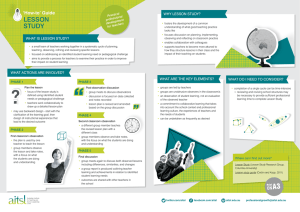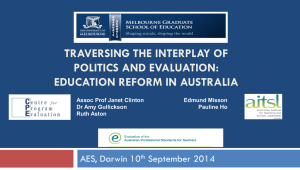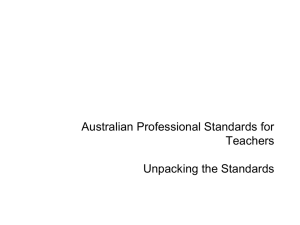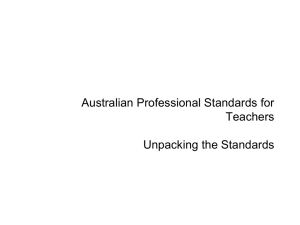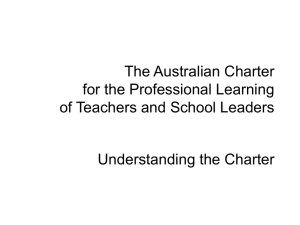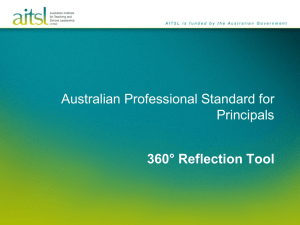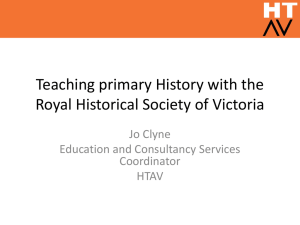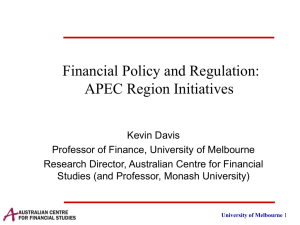ACEL 2014 workshop Shaping Teacher Quality in Australia The
advertisement
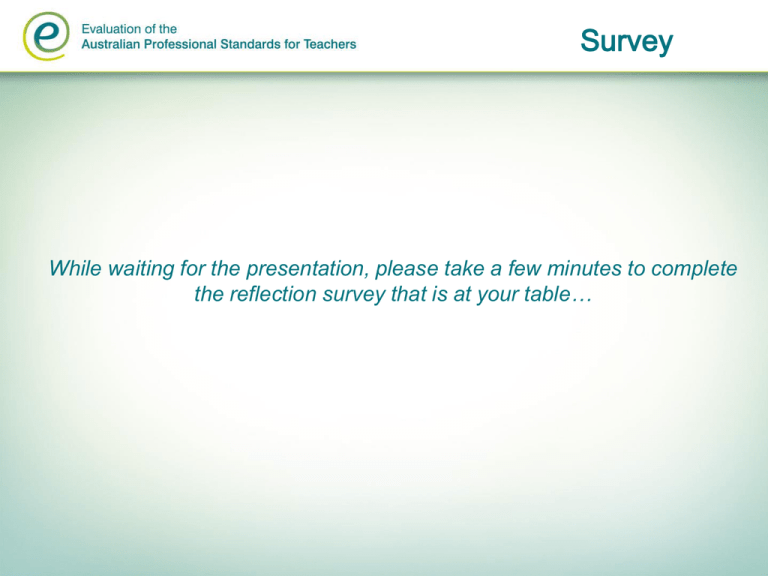
While waiting for the presentation, please take a few minutes to complete the reflection survey that is at your table… 2 Part 1: Evaluation Context Part 2: Workshopping the Implementation Part 3: Feedback and Next Steps Daniel Pinchas AITSL Janet Clinton University of Melbourne Dual purpose: • Improvement – Performance and development – Professional learning • Career progression – Accreditation – Graduate – Registration – Proficient – Certification – Highly Accomplished and Lead • Support Materials Mixed-Methods Informing policy development = Evidence Based Policy Implementation Stage 1- Develop and refine design • • • Phase 1 Build evaluation foundation Establish stakeholder groups and team Lit review & program logic Phase 2 • • • National Forum Stakeholder interviews Collect existing documents Stage 2- Collect evidence Phase 3 • • National Survey #1 National online depository Phase 4 • • Case studies Data collection round #2 Stage 3- Finalise and make recommendations Phase 5 • • • Stakeholder interviews Final data collection round National Survey #2 Phase 6 • • • Triangulation of findings Revisit program logic Draw overall conclusion ACCREDITATION (GRADUATE) SUPPORT MATERIALS AND RESOURCES STUDENTS REGISTRATION (PROFICIENT) TEACHERS AND SCHOOL LEADERS SCHOOLS AND COMMUNITIES SYSTEMS/SECTORS & AUTHORITIES STATES/ TERRITORIES PROFESSIONAL LEARNING CERTIFICATION NATIONAL POLICY PERFORMANCE AND DEVELOPMENT (HA AND LEAD) The majority of education professionals are aware and have knowledge of the Standards 4% Knowledge No knowledge 96% 10 Stakeholder ownership APST implementation Awareness Attitude Knowledge Activity Sustaining behaviour change 11 High 4.53 4.56 4.49 4.4 4.38 4.2 3.97 3.84 3.84 3.42 3.08 2.91 2.84 2.68 2.45 Low Teacher School Leader Teacher Educator Pre-service Teacher Position Type Knowledge Prior Use Positive Attitude Intention to Implement School leaders reported higher levels of knowledge, attitudes and intentions to use the Standards as compared to teachers. 12 High 4.22 3.83 3.76 3.15 2.92 2.73 2.38 Low 0 to 5 Knowledge 6 to 10 11 to 15 16 to 20 21 to 25 Years of Teaching Experience Prior Use Positive Attitude 26 to 30 31+ Intention to Implement 13 • • • • Teachers Self-reflection Lesson planning Professional development needs Collaboration with colleagues • • • • School Leaders Discussion with my teachers Building capacity of colleagues School plans for teaching and learning Supporting PD 14 • • • • • Enablers Leadership support Access to resources Information sharing Standards are seen as a means not an end Sharing effective practices • • • • Challenges Compliance-based, top-down approach Misinterpretation of the Standards Difficulty in ensuring and encouraging teachers to engage Geographical disparity 15 Janet Clinton University of Melbourne 17 • What do you want the implementation to look like in 5 years & how will you get there? • What challenges in your context that need to be overcome? • What do you want to find out from the Evaluation? Please use the butchers paper in front of you Janet Clinton & Edmund Misson University of Melbourne & AITSL 20 • Case studies • National Survey #2 - 2015 aitsl.edu.au
